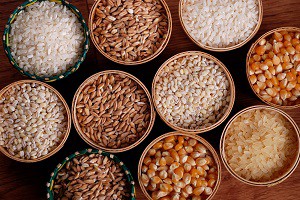Written by Jessica Patella, ND. A meta-analysis of 14 studies (786,076 participants), found an inverse association between grain consumption and the following 3 categories: mortality from all causes, cardiovascular disease, and cancer.
 Governments from around the world recommend consuming whole grains in their dietary guidelines (1). The United States government recommends three or more servings of whole grains per day, but most adults consume less than one serving per day (2). Current findings about the importance of whole grains are varied, but a large meta-analysis combining data from 14 studies found that eating whole grains decreased the risk of death, especially from cardiovascular disease (1).
Governments from around the world recommend consuming whole grains in their dietary guidelines (1). The United States government recommends three or more servings of whole grains per day, but most adults consume less than one serving per day (2). Current findings about the importance of whole grains are varied, but a large meta-analysis combining data from 14 studies found that eating whole grains decreased the risk of death, especially from cardiovascular disease (1).
Whole grains are a rich source of fiber, vitamins, minerals and even phytochemicals or plant chemicals (1, 3). Previous research has observed that higher whole grain intake is associated with a lower risk of type 2 diabetes (4), cardiovascular disease (5), and certain cancers (6).
For the recent research, 14 studies involving a total of 786,076 participants were included in the meta-analysis. A total of 97,867 total deaths were recorded, of which 23,957 were due to cardiovascular reasons and 37,492 were due to cancer (1). The follow-up times of the studies ranged from 6-28 years and the study periods were between 1971 and 2010 (1).
With no whole grain consumption used as the reference, the relative risk of death was as follows:
| Total Mortality (RR) | Cardiovascular Disease Mortality (RR) | Cancer Mortality (RR) | |
|---|---|---|---|
| 10 grams/day whole grains | 0.93 (95%CI, 0.89-0.97; P<0.001) | 0.92 (95% CI, 0.88-0.96:P<0.001) | 0.96 (95% CI, 0.91-1.01; P=0.12) |
| 30 grams/day whole grains | 0.84 (95%CI, 0.77-0.91; P<0.001) | 0.81 (95% CI, 0.75-0.89; P<0.001) | 0.89 (95% CI, 0.89-0.99; P=0.04) |
| 50 grams/day whole grains | 0.80 (95% CI, 0.75-0.85; P<0.001) | 0.78 (95% CI, 0.72-0.84; P<0.001) | 0.85 (95%CI, 0.76-0.94; P=0.001) |
| 70 grams/day whole grains | 0.78 (95% CI, 0.74-0.82; P<0.001) | 0.77 (95%CI, 0.68-0.87; P<0.001) | 0.80 (95%CI, 0.72-0.89; P<0.001) |
These results show a significant inverse association between whole grain consumption and mortality from all causes, cardiovascular disease and cancer (1). The means that the more whole grains consumed, the lower the risk of death from all causes, cardiovascular disease and cancer. These findings support the current dietary recommendations for 3 or more servings of whole grains per day for long-term health and longevity (1). The 3 servings per day would equate to about 48 grams (about 1 2/3 oz.) of whole grains per day (1). It is important to note that refined grains or processed grains have the opposite effect on long-term health (1, 7).
Source: Jacobs Jr, David R., Leonard Marquart, Joanne Slavin, and Lawrence H. Kushi. “Whole‐grain intake and cancer: An expanded review and meta‐analysis.” Nutrition and cancer 30, no. 2 (1998): 85-96.
© 2017 University of York
Posted July 14, 2016.
Jessica Patella, ND, is a naturopathic physician specializing in nutrition and homeopathic medicine and offers a holistic approach to health. She earned her ND from Southwest College of Naturopathic Medicine in Tempe, AZ, and is a member of the North Carolina Association of Naturopathic Physicians. Visit her website at www.awarenesswellness.com.
References:
- this study
- McGill CR, et all. Ten-year trends in fiber and whole grain intakes and food sources for the United States population: National Health and Nutrition Examination Survey 2001-2010. Nutrients. 2015; 7:1110-1130. doi:10.3390/nu7021119.
- Fardet A. New hypotheses for the health-protective mechanisms of whole-grain cereals: what is beyond fibre? Nutr Res Rev. 2010; 23:65-134. doi:10.1017/S0954422410000041.
- Ye EQ, et al. Greater whole-grain intake is associated with lower risk of type 2 diabetes, cardiovascular disease, and weight gain. J Nutr. 2012;142: 1304-1313. d
- Mullen PB, et al. Whole grain intake and cardiovascular disease: a meta-anaylsis. Nutr Metab Cardiovasc Dis. 2008; 18:283-290.
- Jacobs DR Jr, et al. Whole-grain intake and cancer: an expanded review and meta-analysis. Nutr Cancer. 1998;30:85-96.
- AlEssa HB, et al. Carbohydrate quality and quantity and risk of type 2 diabetes to US women. Am J Clin Nutr. 2015; 102:1543-1553.
